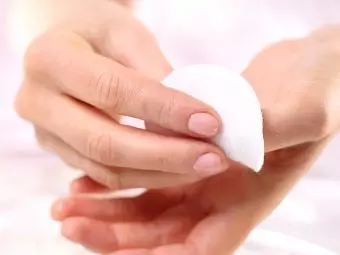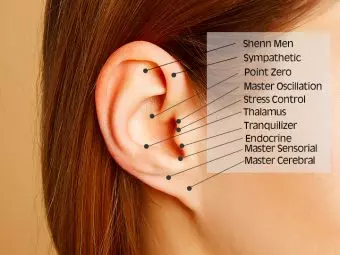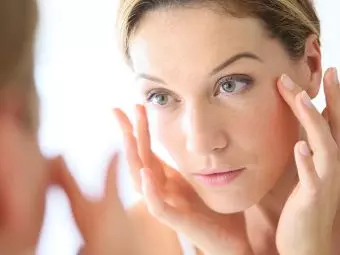Ringworm infection is one of the most common fungal infections that people have to deal with. If you see red, pus-filled patches on your skin that spread to other parts of your body, chances are you have a ringworm infection. The good news is, you can use hydrogen peroxide for ringworms to alleviate the symptoms. In this article, we explore ringworm infection and how hydrogen peroxide is effective in treating ringworms.
In This Article
What Is A Ringworm Infection?
Dermatophytosis, which is commonly known as ringworm, is a fungal infection. It affects various parts of the body, such as the scalp, legs, toenails, and fingernails (1). Ringworm is a contagious infection and can spread easily from person to person.
In some cases, ringworm infection can be contracted from animals. Domestic pets, like cats, dogs, or guinea pigs, can be carriers of this infection (2).
After contracting the infection, one can spot red and itchy spots on their skin. These patches are ring-like in appearance. Scratching is not the best solution as it can cause the infection to spread. If this infection is not treated in the first instance, it can recur. This is where hydrogen peroxide can help.
Does Hydrogen Peroxide Kill Fungus?
Hydrogen peroxide has antibacterial, fungicidal, and sporicidal properties (3). These properties may help in disinfecting the affected area and preventing the spread of infection.
Hydrogen peroxide may help in eliminating ringworm infection with regular use. The treatment period may vary depending on the severity of the case.
How To Use Hydrogen Peroxide To Treat Ringworms
As mentioned earlier, hydrogen peroxide is a readily available formulation. You may easily procure it from a local chemist. It is also an inexpensive yet effective method that may treat ringworm infection.
A visit to your nearest chemist will show you that hydrogen peroxide is available in varying strengths. For treating ringworms, however, you may need to use a 3% solution.
To administer hydrogen peroxide, you will need a sterile cotton ball. Dilute the solution according to the sensitivity of your skin. Consult your doctor to know how much you need to dilute the solution. Soak a cotton ball in the diluted solution. Apply this to the infected area and leave it on for a while. You may do this a few times daily until you see the ringworm infection subside.
Note: Hydrogen peroxide may cause slight skin irritation. It may also cause a stinging sensation on the surface of your skin. If you have sensitive skin, you might experience slight discomfort. In some cases, using a higher quantity of the solution may cause the skin in the affected area to go a little white for a short while. Hence, make sure you talk to your doctor before using this remedy.
Let’s explore some alternative remedies that might be used to treat ringworm.
Does Neosporin Help With Ringworm?
Neosporin is an antibiotic ointment that is used to treat minor skin injuries. Although there is no significant research connecting neosporin to the treatment of ringworm, it is believed that neosporin might help control the ringworm infection at an early stage.
Apart from Neosporin, you can use Miconazole, another antifungal ointment to treat ringworm (4).
Other Alternatives For Treating Ringworm
- Use an antifungal shampoo to clean out your scalp thoroughly (5).
- Clean your hands and fingernails thoroughly with antibacterial soap.
- If you have contracted an infection, let the infected area breathe by not covering it up with tight clothing.
- Make sure to keep your bed covers washed and cleaned.
- Take a shower after your gymming or workout sessions.
- Do not share clothes, towels, or bed sheets with the infected person.
- Change your socks and underwear daily. Put on socks only after washing your feet and drying them completely.
- You can use a prescription antifungal ointment, cream, or lotion (6).
The usage of hydrogen peroxide for ringworms alleviates the symptoms and eliminates the infection. It is one of the inexpensive methods to treat ringworm infection. 3% solution of hydrogen peroxide is generally used to treat ringworm infections. You can dip a cotton ball in the diluted solution and apply it to the affected area. However, a doctor can guide you on the correct dilution rate and process. You can also use antifungal shampoo for treating ringworm infection. In addition, maintaining personal hygiene helps to reduce the risk of infection.
Frequently Asked Questions
Is hydrogen peroxide harmful to the skin?
Yes. Hydrogen peroxide can be harmful to the skin in higher concentrations, causing irritation, blistering, and burning.
Will hydrogen peroxide stop itching?
Anecdotal evidence suggests that it can help soothe itching due to insect bites, skin infections, etc. if used in the recommended dosages.
Can you bathe in hydrogen peroxide?
Yes. You can prepare a hydrogen peroxide bath by mixing it with water in safe concentrations.
Sources
Articles on StyleCraze are backed by verified information from peer-reviewed and academic research papers, reputed organizations, research institutions, and medical associations to ensure accuracy and relevance. Check out our editorial policy for further details.
- Weitzman, I, and R C Summerbell. “The dermatophytes.” Clinical microbiology reviews vol. 8,2 (1995): 240-59.
https://www.ncbi.nlm.nih.gov/pmc/articles/PMC172857/ - Pasquetti, Mario et al. “Infection by Microsporum canis in Paediatric Patients: A Veterinary Perspective.” Veterinary sciences vol. 4,3 46.
https://www.ncbi.nlm.nih.gov/pmc/articles/PMC5644651/ - Baldry, M. G. C. “The bactericidal, fungicidal and sporicidal properties of hydrogen peroxide and peracetic acid.” Journal of Applied Bacteriology 54.3 (1983): 417-423.
https://www.ncbi.nlm.nih.gov/pubmed/6409877 - Rotta, Inajara, et al. “Efficacy of topical antifungal drugs in different dermatomycoses: a systematic review with meta-analysis.” Revista da Associação Médica Brasileira (English Edition) 58.3 (2012): 308-318.
http://www.scielo.br/scielo.php?pid=S0104-42302012000300010&script=sci_arttext&tlng=en - Fuller, L C et al. “Diagnosis and management of scalp ringworm.” BMJ (Clinical research ed.) vol. 326,7388 (2003): 539-41.
https://www.ncbi.nlm.nih.gov/pmc/articles/PMC1125423/ - Jain, Neetu, and Meenakshi Sharma. “Broad spectrum antimycotic drug for the treatment of ringworm infection in human beings.” Current science 85.1 (2003): 30-34.
https://www.jstor.org/stable/24107708?seq=1
Related
The following two tabs change content below.
- Author
- Reviewer
Sucharita Mishra
Sucharita Mishra has a Master’s degree in Biotechnology and specializes in writing on Health and Wellness. She has worked on… more
Dr. Vindhya L Veerula
(MD, FAAD)Dr. Veerula (Dr. V) is a diplomate of the American Board of Dermatology, a Fellow of the American Academy of… more



 How To Take Care Of A New Tattoo And Safety Precautions
How To Take Care Of A New Tattoo And Safety Precautions I Slept With An Onion In My Sock And This Is What Happened
I Slept With An Onion In My Sock And This Is What Happened 6 Brilliant DIY Ideas For Nail Polish Removers
6 Brilliant DIY Ideas For Nail Polish Removers Acupressure Points On Ears: What Are They And Do They Work?
Acupressure Points On Ears: What Are They And Do They Work? 8 Best Ways To Increase Oxygen Levels In Blood
8 Best Ways To Increase Oxygen Levels In Blood 20 Most Beautiful Flowers That Are Commonly Available In India
20 Most Beautiful Flowers That Are Commonly Available In India Top 5 Online Beauty Products Sites For Shopping In India
Top 5 Online Beauty Products Sites For Shopping In India Top 19 Bindi Designs For You To Try
Top 19 Bindi Designs For You To Try 11 Things You Should Never Put On Your Face
11 Things You Should Never Put On Your Face